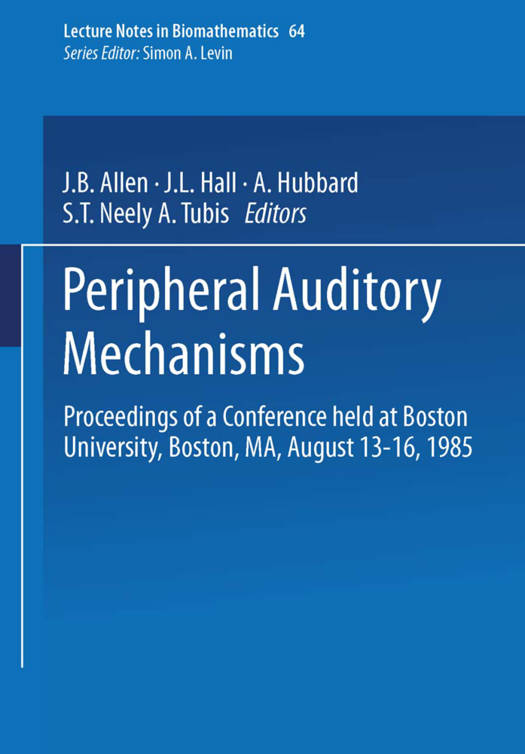
Door een staking bij bpost kan je online bestelling op dit moment iets langer onderweg zijn dan voorzien. Dringend iets nodig? Onze winkels ontvangen jou met open armen!
- Afhalen na 1 uur in een winkel met voorraad
- Gratis thuislevering in België vanaf € 30
- Ruim aanbod met 7 miljoen producten
Door een staking bij bpost kan je online bestelling op dit moment iets langer onderweg zijn dan voorzien. Dringend iets nodig? Onze winkels ontvangen jou met open armen!
- Afhalen na 1 uur in een winkel met voorraad
- Gratis thuislevering in België vanaf € 30
- Ruim aanbod met 7 miljoen producten
Zoeken
Peripheral Auditory Mechanisms
Proceedings of a Conference Held at Boston University, Boston, Ma, August 13-16, 1985
€ 52,95
+ 105 punten
Omschrijving
How weIl can we model experimental observations of the peripheral auditory system'? What theoretical predictions can we make that might be tested'? It was with these questions in mind that we organized the 1985 Mechanics of Hearing Workshop, to bring together auditory researchers to compare models with experimental observations. Tbe workshop forum was inspired by the very successful 1983 Mechanics of Hearing Workshop in Delft [1]. Boston University was chosen as the site of our meeting because of the Boston area's role as a center for hearing research in this country. We made a special effort at this meeting to attract students from around the world, because without students this field will not progress. Financial support for the workshop was provided in part by grant BNS- 8412878 from the National Science Foundation. Modeling is a traditional strategy in science and plays an important role in the scientific method. Models are the bridge between theory and experiment. Tbey test the assumptions made in experimental designs. They are built on experimental results, and they may be used to test hypotheses and predict experimental results. Tbe latter is the scientific method at its best. Cochlear function is very complicated. For this reason, models play animportant role. One goal of modeling is to gain understanding, but the necessary mathematical tools are often formidably complex. An ex am pie of this is found in cochlear macromechanics.
Specificaties
Betrokkenen
- Uitgeverij:
Inhoud
- Aantal bladzijden:
- 402
- Taal:
- Engels
- Reeks:
- Reeksnummer:
- nr. 64
Eigenschappen
- Productcode (EAN):
- 9783540160953
- Verschijningsdatum:
- 1/03/1986
- Uitvoering:
- Paperback
- Formaat:
- Trade paperback (VS)
- Afmetingen:
- 170 mm x 244 mm
- Gewicht:
- 653 g

Alleen bij Standaard Boekhandel
+ 105 punten op je klantenkaart van Standaard Boekhandel
Beoordelingen
We publiceren alleen reviews die voldoen aan de voorwaarden voor reviews. Bekijk onze voorwaarden voor reviews.










